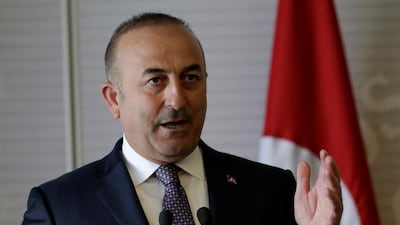Baghdad's bitter dispute with Erbil edged closer to a resolution on Sunday as Turkey's foreign minister arrived in the Iraqi capital to mediate talks between the two sides.
Mevlut Cavusoglu held talks with his Iraqi counterpart, Ibrahim Al Jaafari, stressing Ankara's support for "Iraq's territorial integrity".
After Kurdish voters overwhelmingly backed independence in a referendum last year, the Iraqi government responded with a series of retaliatory measures, including halting international flights to and from the autonomous Kurdish region. Baghdad also sent troops to retake disputed areas held by Kurdish forces outside of Iraqi Kurdistan.
On Monday last week, the two sides reached an initial agreement to lift the flight ban, thought it still needs to be formally approved by Iraqi prime minister Haider Al Abadi.
Ahead of his visit, Mr Cavusoglu said Ankara would play an “effective” role in resolving the crisis.
A diplomatic source told The National that Turkey's involvement was "welcomed by Baghdad", while Iraqi MP Arshad Al Salehi, who heads the Iraqi Turkmen Front party, said Mr Cavusoglu's visit marked "an important step".
"We are aiming to discuss the return of displaced civilians before the upcoming (parliamentary) elections and the reconstruction of various cities."
Iraqis must be in their area of origin to vote in the elections — a factor that has led to calls from some MPs for the polls, currently scheduled for May, to be postponed.
_____________
Read more:
Iraqi returnees surpass number of internally displaced for first time since 2013
Displaced Iraqis forcibly returned home, where ISIL booby-traps abound
_____________
Mr Cavusoglu's visit comes a day after Mr Al Abadi and Kurdish prime minister Nechirvan Barzani held talks for the first time since the Kurdish referendum in September.
The meeting in Baghdad indicated that the two sides were close to resolving their differences.
The two sides "discussed the political and security situation and ways of settling disputes", Mr Al Abadi's office said.
It added that Iraqi Kurdistan's airports would reopen once Baghdad was given "complete control" over them and that "the control of border crossings should be exclusively in the power of federal authority”.
Since the fall of former president Saddam Hussein in 2003, Baghdad and Erbil have squabbled over land and oil revenue sharing.
Also on Sunday, Iraq's supreme court ruled against calls by Sunni and Kurdish MPs to delay the upcoming parliamentary elections to allow the millions of people displaced by war to return home.
The vote must be held "within the time frame provided by the constitution", the court said.
Parliament is expected to meet on Monday when the government hopes MPs will either approve its suggested date of May 12, or agree on another date in May. MPs failed to reach an agreement when they last met to discuss the issue on Saturday, with Sunni parties demanding a delay of at least a year to ensure areas liberated from ISIL are safe enough for displaced people to return to.
The United Nations estimates 2.6 million people remain displaced in Iraq, mostly Sunni Arabs from areas previously controlled by ISIL.
The US embassy in Baghdad mediated on Sunday to resolve the crisis.
On Thursday, the embassy stressed that "postponing the elections would set a dangerous precedent, undermining the constitution and damaging Iraq’s long-term democratic development".
Washington said it would "provide assistance that will help ensure that Iraqi voices are heard and counted", during the elections process.


